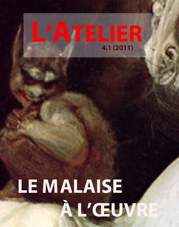« To work on the nerves of the audience, not its intellect » Mal être, mal dire — le malaise à l’œuvre dans les pièces radiophoniques de Samuel Beckett
Keywords:
Beckett, Samuel, Radio playsAbstract
Writing plays for the radio was for Samuel Beckett the occasion of unprecedented vocal experiments. The radio space he designed is remarkably inventive, especially since the malaise of the beckettian subject and the theme of madness can find a literary shape in an extremely disconcerting vocal polyphony.
Even more so than in his work for the stage, these plays develop an aesthetics of the bizarre, the abnormal, the confusional. As the radio medium does away with the actor’s body and its related constraints, Beckett is free to create a paradoxical space able to contain his linguistic and vocal experiments. His creative mastery is informed by his impressive knowledge of medicine, psychiatry and psychoanalysis : in Embers, Rough for Radio I & II and Words and Music, filiation, puerperal or solipsistic delirium, auditory hallucinations or melancholy, all convey different facets of the human alienation of subjects that find themselves “spoken by language” and assaulted by a polyphony of autonomous and competitive voices. The syntactical and lexical dead ends and the interpretative aberrations which the weakened and hollowed out psychology of the subjects gives rise to contribute to the elaboration of a neological language or to occasional imaginary jargon, whose poetic creativity is strongly evocative of the glossolalia of some insane people.
Such multiple rhetorical and dramaturgic strategies put the nerves of the audience under extreme duress and make their malaise an element essential to the theatrical experience.
Pour Samuel Beckett, l’écriture de pièces radiophoniques fut l’occasion d’expériences inédites avec la voix. Son utilisation de l’espace est remarquablement inventive, en particulier parce que le malaise du sujet beckettien et le thème de la folie peuvent trouver une forme littéraire dans une polyphonie vocale déconcertante.
Plus encore que les textes écrits pour la scène, ces pièces servent remarquablement bien une esthétique du bizarre, de l’anormal, du crépusculaire. A la radio, qui, au contraire de la scène, permet d’évacuer le corps de l’acteur et ses contraintes, Beckett sait créer pour le langage et la voix un espace paradoxal et insaisissable. La mise en scène de la folie, riche de l’érudition du dramaturge en matière de médecine, de psychiatrie et de psychanalyse, se déploie en plusieurs thèmes : délire de filiation dans Embers et The Old Tune – adaptation en anglais de la pièce radiophonique de Robert Pinget, La Manivelle – , délire puerpéral dans Rough for Radio I & II, hallucinations auditives, mélancolie et délire solipsiste dans All That Fall, Words and Music et Cascando.
L’aliénation humaine, aux multiples visages, déborde des sujets traversés par le langage ou par une polyphonie de voix autonomes et concurrentielles. En outre, les impasses syntaxiques et lexicales ou encore les aberrations interprétatives contre lesquelles buttent des sujets dont la psychologie s’évide donnent lieu à l’élaboration d’un langage néologique, parfois d'un jargon imaginaire, dont la richesse poétique est fortement évocatrice des glossolalies de certains aliénés.
Ces stratégies rhétoriques et dramaturgiques multiples concourent ainsi à mettre les nerfs de l’auditeur à rude épreuve et à faire de son malaise un élément essentiel de l’expérience théâtrale.
Published
Issue
Section
License
- Work submitted for publication must be original, previously unpublished, and not under consideration for publication elsewhere. If previously published figures, tables, or parts of text are to be included, the copyright-holder's permission must have been obtained prior to submission.
- Authors of accepted manuscripts will assign to L'Atelier the right to electronically distribute their article, or publish it in any form (Internet, CD ROM, printed copy) but authors will retain copyright and, after the article has appeared in L'Atelier, authors may republish their text (in print and/or electronic form) as long as they clearly acknowledge L'Atelier as the original publisher.


